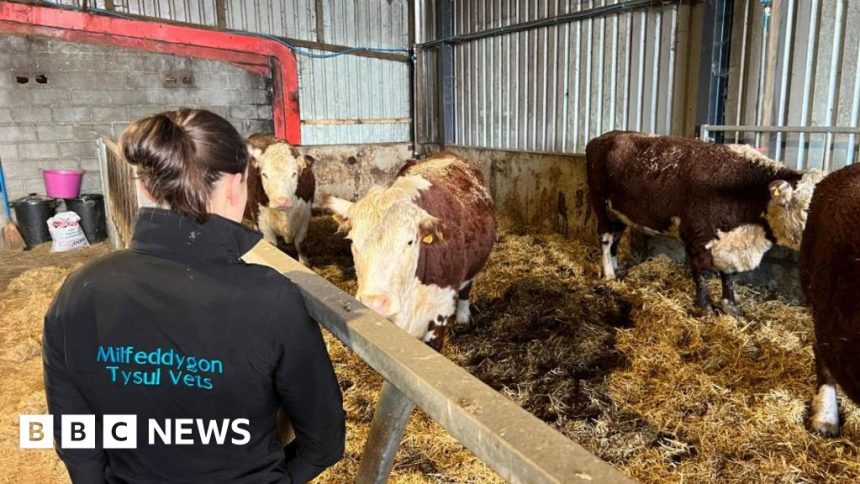Increased vet burden creates animal welfare concerns
 BBC
BBCA lack of veterinary surgeons could have a seriously negative effect on animal health, according to Welsh vets.
Figures provided by the Royal College of Veterinary Surgeons (RCVS) show the number of vets has increased in Wales over the past 10 years – from just over 1,000 in 2014 to 1,488 in 2024.
But according to the British Veterinary Association, these figures do not take into account the significant increase in pet ownership, especially during and since the pandemic.
They also say an increase in paperwork and checks that vets have to complete because of Brexit means they have less time to treat animals.
To put the increased burden into perspective, more than three million homes in the UK welcomed new pets during the pandemic, often because of social isolation.
This took the total number to more than 17 million.
“I graduated 10 years ago,” said vet Elizabeth Harries.
“Like most people, I thought I’d be out and about doing all the fun things, but unfortunately there’s a lot of paperwork and that has increased.
“We have to record all of our visits, our medications use, batch numbers. We also have to help our farmers with their farm health plans, so that can take up a lot of our time.”
In her surgery, she describes how she could easily spend two or three hours doing paperwork in an eight-hour day.
“Unfortunately our clinical work has to come first for obvious reasons,” she added.
“It certainly contributes to the fact our job isn’t a nine-to-five job.
“A lot our paperwork is done in the evening when we’ve officially finished work.”

Ms Harries is a regular visitor to a number of sites – including Blaenffynnon farm in Horeb near Llandysul in Ceredigion.
Such visits allow her to check on the cattle, with the relationship she forms with their owner crucial to keeping them healthy.
She believes if the visits decrease, the animals would suffer, adding: “We’re in a situation, where if we can’t provide a service 24/7, it’s going to have a real negative impact on animal health and welfare.
“Long term, if it carries on as now, then I don’t think it is sustainable.
I think the consequence on the health and welfare of animals could be absolutely huge.”
She believes it is vital enough staff are found to keep the service 24/7 for the agricultural sector.
Ffion Rees, who farms at Blaenffynnon, agrees, saying: “We don’t want to see animals in pain.
“When we call the vet, we really do need them.
“We need a vet all day, and all night. So, yeah, it’s really important.”

A number of vets told BBC Wales they had seen an increase in their workload, and according to the BVA it is a situation being seen across Wales and the UK, especially in rural areas.
The Welsh government said it was clear that there was a need to keep veterinary capacity and capability under review, and that it is aware of the challenges.
A veterinary school in Aberystwyth, Ceredigion is continuing to grow, it added, and “plays an important role to encourage our vets of the future to study and practice veterinary medicine in Wales”.
The UK government said it was working with key stakeholders to address shortages in the profession.
This includes resetting the UK’s relationship with Europe and seeking a new veterinary agreement, whilst also providing high-quality veterinary education within the UK.







